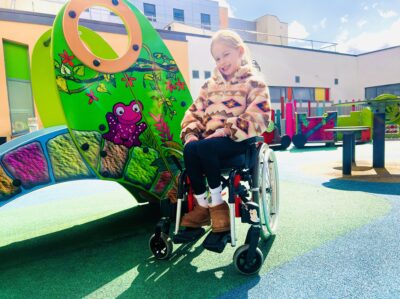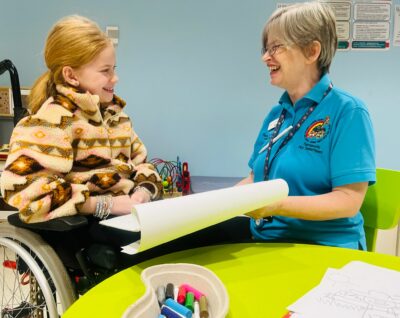Poppy’s story

Poppy is described by her mum as a pocket rocket who bosses everything she sets her mind to in life. She’s a strong, fiery, friendly character who loves her friends, her sausage dog, Luna and like most ten-year-old girls, Taylor Swift.
But unlike most children her age, Poppy has spent a huge part of her life in hospital. In fact, she was a patient before she was even born. In her first decade, Poppy has undergone 20 operations, fought off sepsis four times and has had more hospital admissions than mum, Sam, can count. Sam affectionately calls Noah’s Ark their second home. It’s a true testament to the hospital environment and the people that work within it because, given all that Poppy and her family have been through, you’d forgive them for feeling differently.
Poppy, who is a twin, was diagnosed with Spina Bifida at her mum’s 20 week scan. Poppy and sister, Connie, were delivered at the University Hospital of Wales three and a half weeks early and Poppy was taken straight to NICU to prepare for an operation to close her back. But, uncommonly for spina bifida babies, Poppy’s back was closed. Instead she had been born with an appendage, similar says her mum, to a small tail.
At two-weeks-old, Poppy had an MRI scan. The resulting diagnosis was lipomyelomeningocele a mass attached to Poppy’s spinal cord. As can often happen in such cases, the mass had caused Poppy’s spinal cord to become stuck or tethered instead of floating freely in her spinal canal. This in turn had damaged nerves, disrupting communication with the brain and causing bladder and bowel dysfunction. Back up on NICU, Sam had to learn how to catheterise their tiny baby before she was able to go home.
Having been home for only a few short weeks, Poppy developed the first of many urinary tract infections (UTI). She was taken to hospital but developed sepsis and had to stay in hospital for another two weeks. At three months old, Poppy returned to Cardiff for an operation to remove the lipomyelomeningocele. Though the removal itself was a success, Poppy’s UTIs continued. She was admitted to hospital at least once a month and developed sepsis another three times.
At the age of three Poppy had a vesicostomy, a procedure to create a small opening under the bellybutton to allow urine to be drained out. Though there was hope at first that it would cure or at least reduce the frequency of her UTIs, Poppy’s vesicostomy kept closing and she had several more procedures to open it back up. The disruption this all caused to a child so young took its toll. Poppy started to refuse food and had to be tube fed. Eventually the hole was closed and Poppy’s team started working on other options. By this point, Sam says their whole life revolved around hospital stays and appointments.
Sam said: “Families like ours can’t do anything spontaneous. We’ve only taken Poppy on holiday once because it’s impossible to plan ahead. She can go from fine to very unwell very quickly so we always have to be close to a hospital we know and be prepared for any eventuality.”
Poppy’s next challenge was her kidneys. The high pressure in her bladder had caused her kidneys to scar and she was given Botox in her bladder in an attempt to relax it. But the pressure kept building and the decision was made to make Poppy a new bladder using part of her bowel. In Poppy’s case, the procedure was considered so complex that the operation was expected to take up to 24 hours. In the end it took 14 but, waiting anxiously at her daughter’s bedside for news as she had done so many times before, it felt like forever to Sam.
Though the operation was successful in reducing the pressure, protecting Poppy’s kidneys from further damage, the UTIs continued. Unexpectedly, mucus started to build up in her bladder and resulting in the need for regular bladder washouts to reduce the rate of infection. By this point, a four-year-old Poppy had successfully learnt to catheterise herself.
As Poppy’s body was reacting in unexpected and often unexplained ways, her clinical team at Noah’s Ark got in touch with colleagues in GOSH and Bristol Children’s Hospital to discuss her by now, quite unique case. Having exhausted most other options, the consensus was that Poppy’s tethered spine was the route of her ongoing problems. The surgery was not without its risks but it Poppy was to have any chance of a cure for her ongoing bladder issues, it had to happen.
 The operation went well and after two weeks, Poppy was discharged from hospital. But within a few days, Sam knew that something wasn’t right.
The operation went well and after two weeks, Poppy was discharged from hospital. But within a few days, Sam knew that something wasn’t right.
Sam says: “I’ve always had this sixth sense with Poppy. There’s something in the way she looks and even smells that changes, even before she’s showing any other signs, and I know that I need to act. The team here at the hospital know that, so when I rang them to say we needed to come in, they said yes straight away. She was given an MRI which showed no worrying signs but we were kept in for a few days for observation. Suddenly and seemingly without warning on the second night, Poppy took a drastic turn for the worst. Her heart rate shot up and she was complaining of intense pressure in her head. The scar in her back had also opened up and she was later diagnosed with a form of MRSA.”
This time Poppy was in hospital for three weeks on IV antibiotics and though she is now at home, still returns regularly to Noah’s Ark for checks. She is also unable to walk and uses a wheelchair to get around. It’s a big blow for the girl who loves playing football and netball but she’s working very hard with the physio team and is confident that she’ll be back on the pitch again soon.
Sam said: “This has definitely been the hardest part so far. I know that the operation to untether her spine had to happen, but as a mother I feel a huge sense of guilt. Poppy is so courageous and her strength always renews mine, but she does struggle. She holds a lot of trauma around some of the medical procedures she’s had and is terrified of having to have an anaesthetic. She also hates feeling different and cries with frustration sometimes when she can’t go to school. She’s now seeing a psychologist who’s been a massive help and the children’s hospital is amazing too. I can’t imagine how much harder Poppy’s childhood would have been without the specialist, child friendly facilities Noah’s Ark provides. From the garden where she can play with her sister on her visits, to the playroom and play specialists, it’s all designed with children and families at the heart of it.
Poppy agrees: “I love doing arts and crafts with my play specialist, Sian. She’s very kind and always does things with me when I’m here. Sian has known me since I was small so it makes me feel like I’m safe and at home when I see her. When I’m worried, she always brings me things and distracts me when the doctors need to do things.”
Poppy’s newest hospital friend is sparkle co-ordinator, Emily, who brings the therapy dogs to visit. Poppy misses her own dog, Luna, very much when she’s in hospital and the dog visits help her feel a lot less sad.
Poppy started her hospital journey on South ward, where children were cared for before the purpose built Noah’s Ark came into being. Sam said: “Noah’s Ark is a whole different world to South ward. I don’t know how families like ours managed before it was built, both from an environment an facilities perspective and in terms of the paediatric specialities they now have all under one roof. Like Poppy, so many of the children we’ve come across here have very complex needs and to have all the specialities here with all the specific equipment they need is a game changer. This journey hasn’t been an easy one but we’d do it all a thousand times over for our Poppy. She’s our strength and our inspiration and I know, with the help of everyone around her, she’ll get where she wants to be.”
The difference you make to children like Poppy
Without you, the charity’s supporters, there would be no Noah’s Ark Children’s Hospital for Wales. Over the past 24 years, you have helped build the hospital’s first stage and then equip the second. Today your support continues to help children like Poppy in a whole host of ways. Your donation funded the theatre suites where Poppy had her surgeries, some of the equipment she needed while she was very poorly, the pull down beds where mum, Sam can sleep next to her and the garden where Poppy plays with her sister. Through donating to the Noah’s Ark Charity, you are helping to fund play specialist, Sian, our sparkle co-ordinator, Emily and our counselling service which supports the emotional wellbeing of families during long stays. Thank you.







